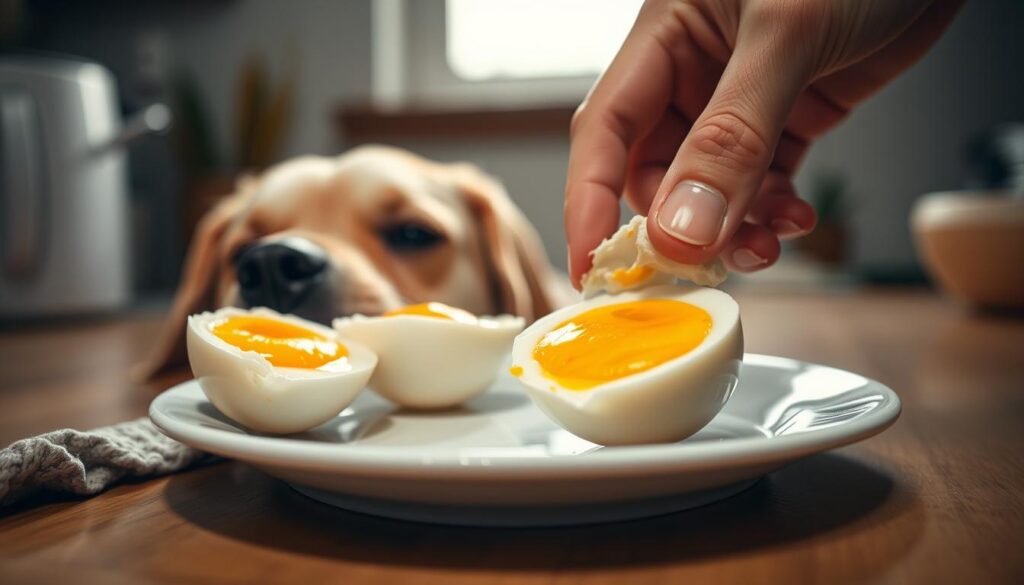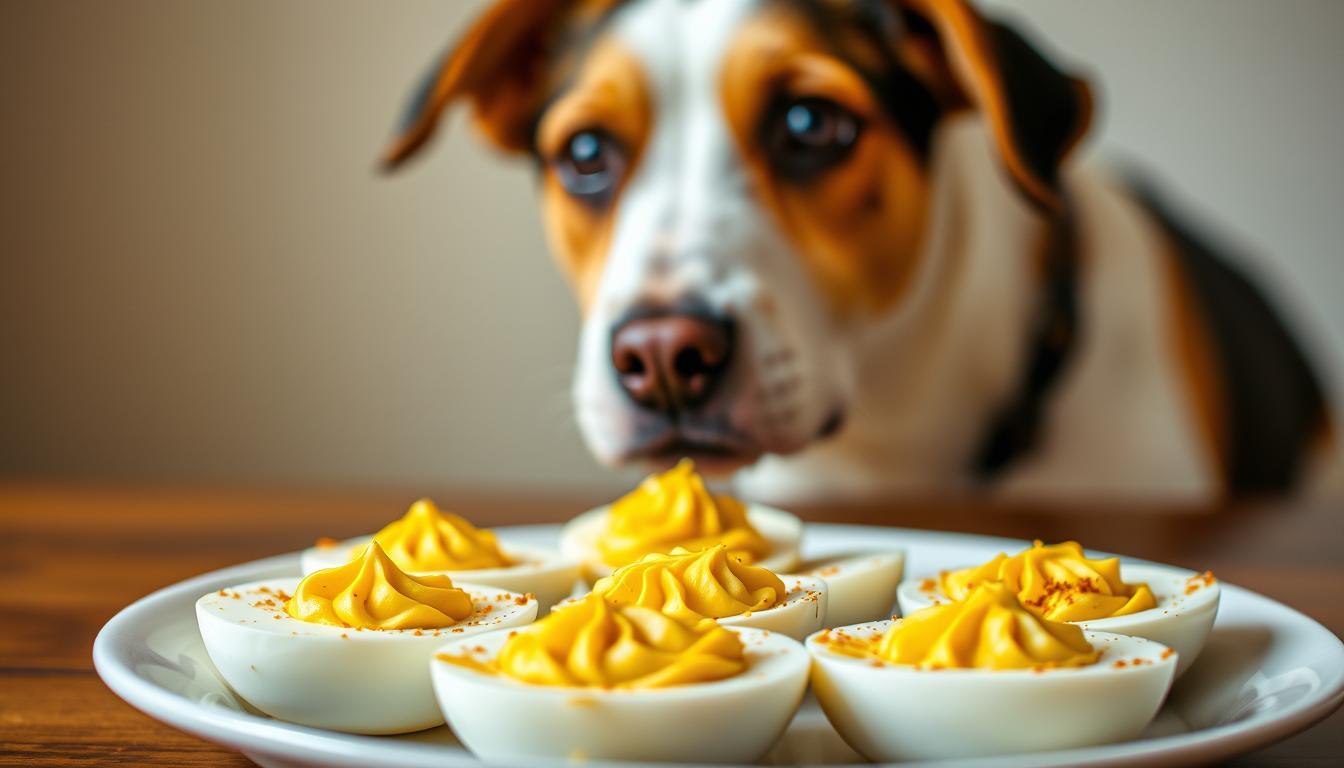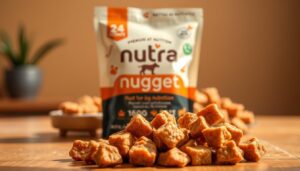As a pet owner, it is key to prioritise your dog’s health and safety. You might wonder, “Can dogs eat deviled eggs?” It is essential to know what’s in deviled eggs and how they might affect your dog. While eggs can be good for dogs, deviled eggs might contain ingredients that are bad for them.
This article provides the safety tips and information you need. It is for dog owners who might consider feeding deviled eggs to their pets.

Key Takeaways
- Deviled eggs can contain ingredients unsafe for dogs.
- Eggs themselves can have health benefits for dogs.
- Understanding common allergens is key to pet health.
- Consult a veterinarian before introducing new foods.
- Portion control is essential for treats.
Understanding Deviled Eggs and Their Ingredients
Deviled eggs are a favourite snack at parties and gatherings. But it’s essential to think about the deviled eggs ingredients when sharing them with dogs. Some ingredients can be harmful or cause dog allergies. Knowing what’s in these eggs helps dog owners make better choices.
Common Ingredients in Deviled Eggs
The basic recipe for deviled eggs includes:
- Hard-boiled eggs
- Mayonnaise
- Mustard
- Salt
- Pepper
- Paprika
Hard-boiled eggs are good for dogs because they’re full of protein. But mayonnaise has added sugars and preservatives that dogs shouldn’t eat. Mustard can upset a dog’s stomach. Salt and pepper should be used carefully because too much can harm dogs. Paprika might also cause stomach problems in dogs.
Possible Allergens for Dogs
Be careful when giving human food to dogs because of common allergens. Dogs might be allergic to:
- Dairy products
- Wheat
- Eggs
- Spices
Some dogs get upset stomachs or skin issues from these allergens. Watch your dog closely if it eats foods it’s not used to. This helps you determine which foods are safe for dogs and which to avoid.
Can Dogs Eat Deviled Eggs?
Deviled eggs for dogs are a mixed bag. Eggs are great for dogs because they contain protein, vitamins, and minerals. But, deviled eggs have ingredients that might not be good for dogs. Knowing this helps us choose better treats for our furry friends.
Health Benefits of Eggs for Dogs
Eggs are super nutritious for dogs. They have:
- High-quality protein for muscles.
- Vitamins A, B, and D for health.
- Fatty acids for a shiny coat and skin.
- Amino acids for body functions.
So, adding cooked eggs to a dog’s diet is usually a good idea.
Risks of Feeding Dogs Deviled Eggs
Even though eggs are good, deviled eggs have risks. Ingredients like mayonnaise, mustard, and spices can be harmful to dogs. Here’s why:
| Ingredient | Potential Risks |
|---|---|
| Mayonnaise | High in fat and calories, it can lead to obesity. |
| Mustard | May cause gastrointestinal upset. |
| Spices (such as onion or garlic) | It can be toxic to dogs in specific amounts. |
It’s essential to watch out for these ingredients. Dogs with sensitive stomachs might do better with plain scrambled or boiled eggs.

Safety Tips for Feeding Eggs to Your Dog
Adding eggs to your dog’s diet can be great, but safety is key. Knowing how to prepare eggs for dogs and the right portion sizes is essential. This ensures a positive experience for both you and your dog.
How to Prepare Eggs for Dogs
Choosing the proper cooking method for eggs is vital. Here are some safe options:
- Boiled Eggs: Hard-boiling eggs keeps nutrients safe.
- Scrambled Eggs: Scramble eggs without oil or salt for a tasty treat.
- Oven-Baked Eggs: Bake eggs in a muffin tin for a unique, plain treat.
Avoid raw eggs to prevent Salmonella and other bacteria. Stick to these safe options for a healthy treat.
Portion Size Recommendations
Knowing the correct portion sizes for eggs is essential. A half egg is suitable for small breeds, while big dogs can have a whole egg. Remember:
- Adjust portions based on your dog’s size and activity.
- Eggs should be a supplement, not a main food.
- Please don’t overdo it to avoid digestive problems.
Following these tips, you can safely add eggs to your dog’s diet without harming their health.

Conclusion
Eggs can be great for your dog’s diet, but you must watch what’s in deviled eggs. These tasty treats might have things that aren’t good for your pet. So, considering the risks before giving them deviled eggs is key.
When eggs are cooked right, they can be suitable for dogs. They give protein and fatty acids that dogs need. But you must be careful about how they’re made and how much you give.
Talk to a vet before adding new foods like deviled eggs to your dog’s diet. They can help make sure the food is right for your dog. This way, you can make your dog’s meals better for both of you.
FAQ
Yes, dogs can eat plain cooked eggs. They are a good source of protein and nutrients. For safety, make sure to cook them without oils or spices.
No, deviled eggs are not safe for dogs. They contain mayonnaise, mustard, and spices. These can harm or irritate a dog’s digestive system.
Watch for signs of discomfort or allergies if your dog eats deviled eggs. Call your vet if you see any unusual symptoms.
Eggs are full of protein, vitamins, and minerals. When given in moderation, they help improve a dog’s skin and coat and contribute to overall health.
Mayonnaise and mustard in deviled eggs can upset a dog’s stomach. They may also cause allergic reactions. Too much sodium is another concern.
Cook eggs by boiling or scrambling without salt or oil. Make sure they are fully cooked. This avoids risks from raw eggs, like Salmonella.
The number of eggs depends on your dog’s size and diet. One egg as a treat a few times a week is usually safe. It should complement a balanced diet.
Yes, puppies can have cooked eggs in moderation. But they should be part of a complete diet for their growth. Always check with your vet for advice.
Signs of an allergy include vomiting, diarrhoea, skin issues, or itching. If you think your dog has an allergy, see your vet immediately.
Yes! Healthy options like carrots, green beans, or dog treats made for their needs are great. They meet your dog’s nutritional and taste preferences.





awesome
I cling on to listening to the news lecture about getting boundless online grant applications so I have been looking around for the top site to get one. Could you tell me please, where could i get some?
To add sophistication and uniqueness to your special day, consider using [url=http://stampbystep.com/]personalized stamps for wedding invitations[/url] on your invitations and wedding cards.
The tradition of using wedding stamps dates back to a time when invitations were truly special, and the stamp was a symbol of the occasion. Many couples choose to use custom wedding stamps to add a personal touch to their wedding invitations Couples often opt for personalized wedding stamps to give their invitations a bespoke feel . Some wedding stamps feature the couple’s names, while others feature a special message or the wedding date Others feature a heartfelt message or the wedding date in a decorative design .
The use of wedding stamps can also be a great way to set the tone for the wedding Wedding stamps can help set the tone for the wedding, whether it’s formal or casual . For example, a formal wedding might feature a traditional wedding stamp with a elegant design A traditional wedding stamp with a elegant font is perfect for a formal wedding . On the other hand, a casual wedding might feature a more playful wedding stamp with a fun design A wedding stamp with a lively and carefree design is great for a casual wedding. The options are endless, and couples can choose the wedding stamp that best fits their style and theme With so many wedding stamp options available, couples can choose the one that perfectly matches their wedding vision.
There are many different types of wedding stamps available, ranging from traditional to modern Wedding stamps come in a wide range of styles, from elegant to trendy. Some wedding stamps feature a classic design with a elegant font and a simple border Many wedding stamps have a classic design with a stunning font and a simple yet elegant border. These types of wedding stamps are perfect for formal weddings or for couples who want a traditional look Traditional wedding stamps are great for couples who want a timeless and elegant design . Other wedding stamps feature a more modern design with bright colors and bold fonts Other wedding stamps have a contemporary design with vibrant colors and trendy fonts . These types of wedding stamps are perfect for casual weddings or for couples who want a unique and playful look These wedding stamps are great for casual weddings or for couples who want a fun and quirky design .
Some wedding stamps also feature a special theme or design, such as a beach or a mountain Others feature a unique theme or design, such as a city or a forest . These types of wedding stamps are perfect for couples who want to incorporate their wedding location into their invitations Themed wedding stamps are perfect for couples who want to tie in their wedding location with their invitations . For example, a couple getting married on the beach might choose a wedding stamp with a beach theme A wedding stamp with a beach theme is great for a couple who wants to incorporate the beach into their wedding invitations. On the other hand, a couple getting married in the mountains might choose a wedding stamp with a mountain theme A couple getting married in the mountains might choose a wedding stamp with a mountain design .
Using wedding stamps can have many benefits for couples planning their wedding The benefits of using wedding stamps are numerous, and couples can enjoy many perks . One of the main benefits is that wedding stamps can add a personal touch to wedding invitations Using a wedding stamp can give wedding invitations a unique and personalized feel . This can help couples stand out and make their wedding invitations more memorable Wedding stamps can help couples create a lasting impression with their wedding invitations. Another benefit is that wedding stamps can save couples time and money Wedding stamps can save couples time and money, as they are often less expensive than traditional mailing methods . For example, couples can use a single wedding stamp on all of their invitations, rather than having to affix a separate stamp to each one Wedding stamps can make it easier and more efficient to mail wedding invitations.
Using wedding stamps can also help couples create a cohesive look and feel for their wedding Using wedding stamps can help couples create a cohesive look and feel for their wedding, from the invitations to the thank-you cards . This can help create a sense of continuity and flow throughout the wedding Wedding stamps can help couples create a seamless and integrated look for their wedding. For example, a couple might choose a wedding stamp with a floral design and use it on their invitations, programs, and thank-you cards A wedding stamp with a floral design can be used on all of the wedding stationery, from the invitations to the place cards . This can help create a beautiful and cohesive look that ties together all of the elements of the wedding This can help create a beautiful and cohesive look that ties together all of the elements of the wedding, from the invitations to the decorations .
In conclusion, wedding stamps are a great way to add a personal touch to wedding invitations and create a cohesive look and feel for the wedding In conclusion, wedding stamps are a fantastic way to add a personal touch to wedding invitations and create a unified look for the wedding . With so many different types of wedding stamps available, couples can choose the one that best fits their style and theme With so many different types of wedding stamps available, couples can select the one that best suits their style and theme . Whether you’re planning a formal or casual wedding, there’s a wedding stamp that’s perfect for you Whether you’re planning a small or large wedding, there’s a wedding stamp that’s ideal for your wedding. So why not consider using a wedding stamp to make your wedding invitations truly special Why not use a wedding stamp to add a personal touch to your wedding invitations and create a cohesive look for your wedding ? So why not consider the benefits of using wedding stamps and how they can make your wedding invitations more special .